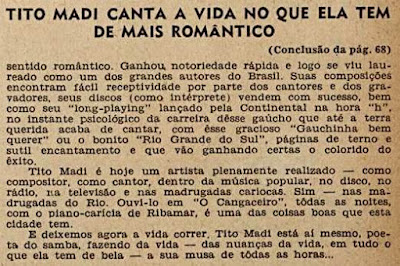Radiolandia #28, 1954; Tito Madi when 'Não diga não' was released in late 1954; seen here with Emissoras Associadas radio man Antonio Pimentel.
Radiolandia #131, 6 October 1956.
Jirau was a night club located on Rua Rodolfo Dantas, next to posh Copacabana Palace Hotel. It was owned by Silvia Autuori who had been a pioneer radio-woman and made money in the 1930s and 1940s presenting programmes for women and children on Radio Ipanema & then Radio Tupi.
Tito Madi accompanied by Ribamar on the piano and Paulinho on the guitar was an instant hit with the patrons extending their stint for months & months.
Radiolandia #131, 6 October 1965.
Radiolandia #139, 1st December 1956.
Tito Madi had a good 1956. He toured Rio Grande do Sul earlier in the year and wrote 'Gauchinha bem querer' where he extolls the beauty of the girl and the place. He tune hadn't been recorded yet and it was known as 'Rio Grande do Sul'.
The girl in the article is singer Maria Lopes who now shared the bill at Jirau. Maria was also signed by Radio & TV Tupi Channel 6.
Tito Madi & Buck Ram - Radiolandia #186, 26 October 1957.
When US rhythm'n'blues combo The Platters toured Brazil in September 1957, their manager-cum-song-writer Buck Ram was impressed by the beauty of some of Tito Madi's songs and made a point of taking them back to the USA in order for Tony Williams to belt it in English.
MC Cesar de Alencar had met Buck Ram in Sao Paulo during The Platters stint at Theatro Paramount and promised him to introduce him Tito Madi, the man who had written 'Chove lá fora' that was a hit at the moment. When The Platters travelled to Rio to sing at TV Tupi, Channel 6, Alencar asked Nora Ney to invite Mr Ram for a 'feijoada' and introduce him to Tito.
The Platters ended up covering 'Chove lá fora' as 'It's raining outside', 'Quero-te assim' as 'I wish' and 'Rio triste' as 'Sad river'.
Buck Ram, the man who wrote 'Only you' for The Platters & Tito Madi toast for their future partnership.
Radiolandia #191, 30 November 1957.
Radiolandia # 225, 26 July 1958.
Radiolandia #225, 26 July 1958.
Radiolandia summarizes Tito Madi's career since he broke out with 'Não diga não'. Soared up to the skies with 'Chove lá fora', followed it up with 'Quero-te assim' and now with 'Gauchinha bem querer' aka 'Rio Grande do Sul'.
Tito & Ribamar were now performing at 'O Cangaceiro' a new night club.
Tito Madi was not handsome but he had a certain charm...
Tito is proud of having been born in Pirajuí-SP - Radiolandia #256, 28 February 1959.
Pirajuí's proud son! Radiolandia #256, 28 February 1959.
Orlando Correia left RCA and signs with Continental Records being welcomed by João Teixeira from the label's legal department, Tito Madi - who may be thinking about his own departure from the label for it was an open secret Tito was in talks with Columbia Records - Risadinha (wearing sun-glasses), actress-singer Luely Figueiró and journalist Costa Amaro who headed the promotion department at the label.
Radiolandia #270, 6 June 1959.
by 1960, what is called Bossa Nova was already discussed by the music press... and that's what Radiolandia asked Tito Madi: Who started this new trend of singing samba sweet and low? Madi says he started singing this way in 1955.
Radiolandia #329, 23rd July 1960. Tito Madi who wrote most of his songs takes 'Menina moça' to #1 in the Brazilian charts.
'Correio da Manhã', 12 May 1960.
'Correio da Manhã', 22nd July 1962.





























